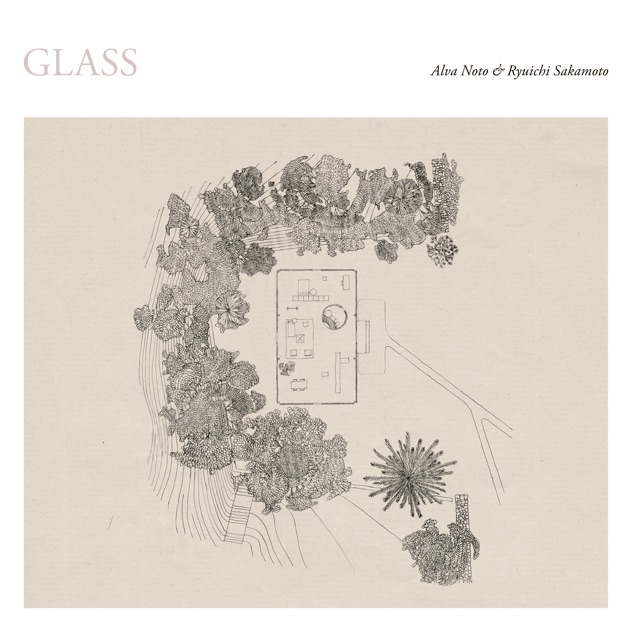Alva Noto & Ryuichi Sakamoto Glass
Immersive improvisation from two masters.

Alva Noto and Ryuichi Sakamoto—two senior figures in experimental music—have collaborated on six albums since 2002. Glass is a recording of their live improvisation, after just one rehearsal, at the architect Philip Johnson’s Glass House in Connecticut, using keyboards, mixers, glass singing bowls, crotales, and the architecture itself as an instrument.
This album is one track, 36 minutes in length. Moreso than some less narrative styles, it demands listening from start to finish. It is a story—an experience open to interpretation; and if an album of 10 tracks with silence between is a novel with chapters, Glass is a single poem of continuous verse. It is deeply immersive. And transportive.
The album begins with Ryuichi playing deeply reverberant harmonies on the crystal bowls, and Alva makes soft arching tones with a bow on the crotales, like miniature cymbals. (There’s a video recording online.) The sonic landscape deepens and extends with plush synthesised drones and granular textures, like nails tapping on glass and cascading wind chimes. What you might call sudden alien voices are Ryuichi dragging and drumming rubber mallets across the contact-mic’d glass walls of the house. The mood all this creates lies somewhere between tension and lullaby.
The arrangement flows on with subtly shifting elements; a layer introduced, another faded out, a sudden wave rising and breaking. And the effect you might experience is your imagination soaring at a meditative state that is both acutely conscious and blissfully dreamlike. Only as the sounds recede does the music’s momentum wind down. You anticipate the end and regain a more ordinary sense of time passing. To not disturb your listening pleasure, like in the cinema, this album should have a no-phones policy.
As a duo, Alva and Ryuichi have attained a virtuosic union. In their early works, such as the wonderful first album Vrioon, it is clear who’s doing what: Ryuichi on treated piano and Alva on electronics making glitch sounds. But the music of Glass is even more unified; the pair play a mix of acoustic and electronic instruments, and after so many years working together, this particular collaboration feels like the product of a single entity.
On reflection, Glass exemplifies what a beautifully mysterious form ambient improvisation can be. For just about the entire listening process, the boundary between your conscious and unconscious is diminished. You become almost unaware that you are listening to an audio recording for the music has somehow merged with your travelling thoughts. It’s like diving into a pool and swimming with your breath held the whole length. And then, when you break the water surface—itself like glass—and the music ends, you abruptly return to your reality. You might be left thoughtful and quiet, but most likely you’ll wish to dive straight back in.

